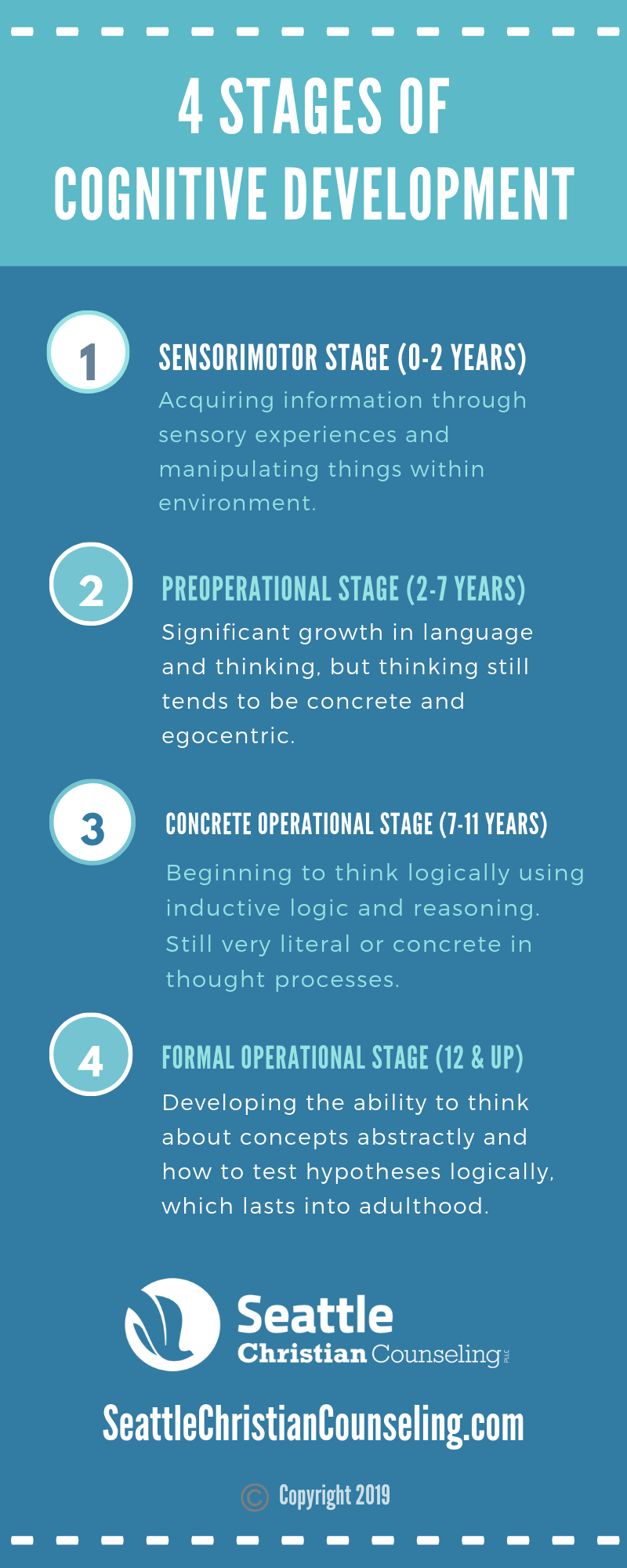 A common theme with new parents is to stimulate and help our children to meet their developmental milestones. We are constantly looking for our children to coo, to grab for things, to roll over, to crawl, and eventually to begin talking and walking.
A common theme with new parents is to stimulate and help our children to meet their developmental milestones. We are constantly looking for our children to coo, to grab for things, to roll over, to crawl, and eventually to begin talking and walking.
However, our children’s cognitive development is just as important as those physical milestones as well. Parents should be aware of how their children’s cognitive development is evolving. This is not just for new parents, but also for parents with children of all ages since we see cognitive developments over the lifespan of our children.
Cognitive Development Theory
Cognitive development considers how our children’s minds are developing. Jean Piaget’s Theory of Cognitive Development looks at how children become little scientists of the world around them.
Piaget supported that children are active parts in their own learning, by making observations about the world around them and by creating their own experiences to investigate the world around them.
From this active interaction children grow in knowledge, build on previous knowledge, and adapt to accommodate new knowledge. Piaget’s theory is about how our children acquire new information, but also about how they comprehend or understand what they are learning.
Jean Piaget Stages of Cognitive Development
Piaget’s Theory of Cognitive Learning is broken down into four stages. The first stage is the sensorimotor stage, encompassing birth to 2 years old. Then there is the preoperational stage for ages 2 to 7 years old, followed by the concrete operational stage for ages 7 to 11, and finishes with ages 12 and up for the formal operational stage.

Understanding the differences in each stage can help us understand where our children are at in cognitive development and allow us to help aid them in the growth of their own understanding and experiences of the world around them.
These stages are always experienced in the same order for each child, however there are factors that play into a child’s development. Both biological and environmental interactions can determine development for a child.
Stages cannot be skipped, but each individual will experience the stages in their unique way and at their unique rate, and some individuals may never attain the later stages. The ages given for each stage is the rate at which an average child would experience it, but it is dependent on the individual.
Jean Piaget
Jean Piaget was a Swiss Psychologist from the late 1800’s. Piaget’s curiosity with cognitive development began from watching his own nephew and daughter, I assume, much like how today’s parents look at their children with admiration for the accomplishments they make.
From observing his nephew and daughter, his hypothesis was formed that children’s minds must be different from adults and not just smaller versions of our adult minds. Rather, he hypothesized intelligence must grow and develop through stages. As we develop, we do not just become quicker thinkers, but the type of thinking we do changes as well. Children think differently than adults do.
Sensorimotor Stage: Birth to 2 years old
During this stage, children go through dramatic periods of growth. Over two years children go from infants who need every one of their needs met to toddlers who come across as tiny adults sometimes.
 Children are learning to walk, talk, eat, sleep, interact with people, interact with the environment, how to go to the bathroom – the list could go on forever.
Children are learning to walk, talk, eat, sleep, interact with people, interact with the environment, how to go to the bathroom – the list could go on forever.
Since they are learning so much in such a small window of time, it makes sense that Piaget would note that infants and toddlers acquire their information through sensory experiences and manipulating things in their environment. They are learning through basic reflexes, senses, and motor responses during this stage of cognitive development.
The sensorimotor stage covers such a large expanse of new information for children in such a short amount of time that Piaget broke this stage down further into 6 different substages.
Substage 1
This is the first part of cognitive development for infants from newborns to about 1 month, however, this is unique to each individual baby and their experiences. This substage focuses on reflexes. Infants work on learning, practicing, and perfecting their primary reflexes such as grasping, looking, sucking, and listening.
Substage 2
Piaget categorized the second substage as the primary circular reactions, and it typically encompasses infants between 1 and 4 months typically. Using their primary reflexes, infants begin interacting with different actions that interest them, such as kicking their feet. They begin repeating these actions they like or that interest them over and over again. This is done in a circular process where infants repeat their reactions and response to their own bodies.
Substage 3
After substage 2, infants reach the secondary circular reactions between the ages of 4 and 8 months old. Infants begin to repeat actions that now interact with the environment or people around them. For example, they may continually laugh at a silly face their mom makes because it interests them or shake a rattle over and over again because they like the sound.
Substage 4
During the months of 8 and 12, infants begin the coordination of secondary circular reactions. This is where the important skill of object permanence comes into play. Object permanence is understanding that objects still exist even when you cannot see them.
During substage 4, infants become goal directed because they have developed object permanence and can begin reaching for objects, finding hidden objects, and incorporating more of their environment into their play and daily actives.
Substage 5
Substage 5 is referred to as the tertiary circular reactions and happens between the ages of 12 and 18 months. Now toddlers, our children begin to investigate and get innovative with new behaviors.
Toddlers are much more creative than infants. They begin to try many different variations of behaviors they have already learned. Instead of repeating the same thing over and over again, they begin the process of trial and error.
Substage 6
The final part of the Sensorimotor stage is mental combinations, which happens between 18 and 24 months. This is when problem solving develops for our toddlers.
Toddlers begin to process situations and look for a solution to their problem before acting on the problem. Object permanence develops even further, which indicates they are moving toward the second stage of Piaget’s cognitive development.
Understanding which substage your infant or toddler is in can help you to incorporate different activities and types of play for your child to continue to develop in their cognitive abilities. You can also begin to understand what they are learning.
Important characteristic and developmental changes that infants and toddlers are learning in the Sensorimotor stage include:
- Items continue to exist even though they cannot see them anymore (object permanence).
- They are separate beings from the things and people around them.
- Their actions can cause things to happen, and they learn to think about problems before acting.
These characteristics and developmental changes lead toddlers into the next stage of development, which is the Preoperational stage.
Preoperational Stage: 2 to 7 years old
During this stage, children are still functioning out of egocentric thought processes. This means children have a harder time taking other viewpoints, but instead their thinking revolves around them.
 They haven’t developed the skills to think through the perspective of others on their own. Young children do, however, begin to think symbolically about things. This means they can attach words and pictures to represent objects.
They haven’t developed the skills to think through the perspective of others on their own. Young children do, however, begin to think symbolically about things. This means they can attach words and pictures to represent objects.
Children during this stage are developing in leaps and bounds in their language and thinking, but their thinking tends to still be concrete. The growth of language is the major trademark of the preoperational stage of development.
A child’s use of pretend play increases during this stage and plays a large role in learning. Children begin to include other children in their games and play.
Understanding that children in the preoperational stage still think rather concretely can help with communication. For example, when you offer to play with playdough with your child, you could divide it into two equal parts, and then flatten one while you roll the other into a ball.
When you offer it to your child they will most likely pick the flattened one because they think it’s “bigger.” However, we know they are equal. When they see the flattened playdough and it looks bigger to them, this is an example of concrete thinking. Understanding this allows us to be more patient when explaining new ideas and thoughts to our children in the preoperational stage.
Concrete Operational Stage: 7 to 11 years old
Piaget believed the concrete operating stage was a major turning point for a child’s development because it is marked by the beginning of logical thinking. This means children are beginning to work situations or problems out internally rather than physically in the real world.
 Children begin to think through things before physically trying them out. Even though children begin to think more logically, they are still very literal or concrete in this point of development. They are starting to become better at thinking about how other people might feel or view a situation.
Children begin to think through things before physically trying them out. Even though children begin to think more logically, they are still very literal or concrete in this point of development. They are starting to become better at thinking about how other people might feel or view a situation.
Children in this stage are using inductive logic and reasoning, which means you can work with them to think through situations and in logical progression. However, they are still rather concrete or rigid in this thinking. They still struggle to grasp abstract concepts. They can follow logical progressions, but anything less logical can be difficult for them to understand and hold onto.
One example of the growth in a child’s development during the concrete operational stage is their understanding of conservation in the form of liquid. Children are able to follow the logic of the amount of liquid not changing, even when it is represented differently in different shaped glasses.
Formal Operational Stage: 12 years old and up
Once a child has crossed into the formal operational stage, they begin the process of developing the ability to think about concepts abstractly and how to test hypotheses logically. This lasts into adulthood.
In the formal operational stage, children or teens start to think through and process moral, philosophical, ethical, social, and political issues that require more complex thought processes. This is when abstract or theoretical reasoning begins to develop. This idea of abstract thinking is the trademark aspect of the formal operational stage.
However, during this stage, teens and on begin to practice deductive logic to move from a general idea to more specific information. This continues to develop into young adulthood and on.
Why is it important to understand Piaget’s 4 Stages of Cognitive Development?
Understanding the Piaget’s stages of development helps parents, teachers, and other professionals and natural members of a child’s life understand where the child is at. It helps aid in creating developmentally appropriate activities to stimulate the development growth.
It also helps to avoid frustration or confusion when a child isn’t understanding something you thought they should. Looking back at Piaget’s stages of development helps the parents, educators, family members, and professionals see where their child is at currently and how to help them progress in their development.
The best example I can give for each stage is the concept of looking at water. During the sensorimotor stage, infants and toddlers learn that water something in their environment. In the preoperational stage, children begin to understand the water is separate from them and what water is used for. In the concrete operational stage, children begin to understand that water doesn’t change just because it is put into different containers. Finally, when a teen is in the formal operational stage, they begin asking questions such as, “Is the water glass half full or half empty?”
With this example we can see how over time a child’s cognitive understanding changes and develops. Children do not just add to their knowledge but change the way they think about the world around them.
What next? Counseling for Cognitive Development Issues
When it comes to counseling, it is important to make sure the counselor you choose is aware of the four stages of cognitive development. This allows for your child’s counselor to be the most beneficial.
For example, they will understand a 6-year-old cannot grasp the logical progression of problem solving internally, but instead can work on skill building for solving difficult situations.
It is also important for your child’s counselor to understand cognitive function so they can help with age-appropriate activities and games so they can strengthen and encourage the cognitive growth of your child.
If you ever find yourself in a positon where you think your child may need someone to talk to or to work with, I would love to be a resource for you. Come in for a risk-free session and we can see if we can meet your needs and the needs of your child.
References
https://www.verywellmind.com/piagets-stages-of-cognitive-development-2795457
https://www.pgpedia.com/s/sensorimotor-stage
“Happy Baby”, Courtesy of Janko Ferlic, Unsplash.com, CC0 License; “Football Outside Jakarta”, Courtesy of Robert Collins, Unsplash.com, CC0 License; “Happy Student”, Courtesy of Ben Mullins, Unsplash.com, CC0 License; “LaughingTeen”, Courtesy of Cristina Pop, Unsplash.com, CC0 License





